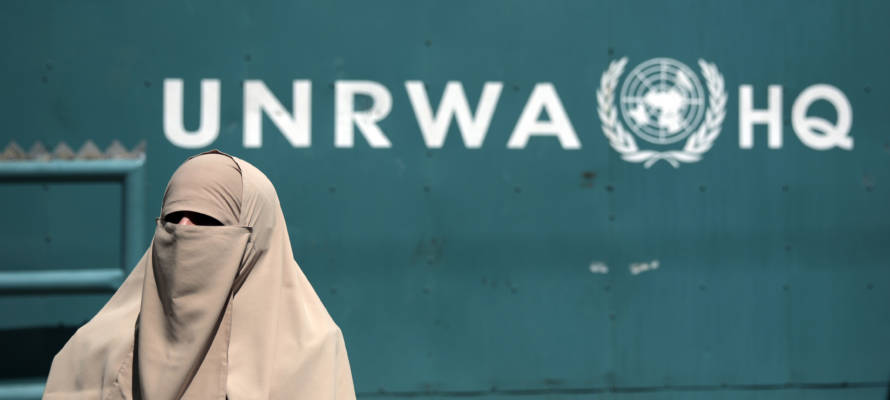UNRWA has only suspended or removed an employee for belonging to Hamas in very rare instances.
By Mike Wagenheim, JNS
Critics of the U.N. Relief and Works Agency, UNRWA, have long noted its unique approach among United Nations agencies in granting perpetual refugee status to Palestinians, while other U.N. agencies seek to resettle those displaced by war or violence. A JNS investigation reveals another manner in which UNRWA is an apparent aberration at the global body: It does not revoke refugee status of Palestinian terrorists.
The U.N. High Commissioner for Refugees oversees the global body’s services to all refugees worldwide, except for Palestinians, who fall under the purview of UNRWA.
The latter is being investigated following Israeli charges that some of the U.N. agency’s staff participated directly in Hamas’s Oct. 7 terror attack on Israel and that a larger number of UNRWA employees are tied to Palestinian terror organizations.
Those involved in acts of terrorism under globally-defined criteria are subject to exclusion from refugee status at UNHCR, which also may exclude refugees who belong to organizations that carry out or incite violence.
JNS sought comment several times from UNRWA and from the office of António Guterres, the U.N. secretary-general, about whether the agency also excludes terrorists as refugees.
Hillel Neuer, executive director of the nonprofit U.N. Watch, told JNS that for many years, Suhail al-Hindi, a school principal elected to chair UNRWA’s Palestinians’ workers union, was on Hamas’s Gaza politburo with the terror group’s Gaza head Yahya Sinwar.
Al-Hindi was eventually forced out of UNRWA not due to a violation of agency policy, but because UNRWA suffered too much embarrassment, Neuer said.
“They asked him to resign, meaning he’s probably still collecting pension,” Neuer said. “He’s now in Turkey, and he’s regularly quoted endorsing the atrocities of Oct. 7. It’s not only that they don’t deny them aid, but they allow them to serve in leadership capacity.”
“To the extent that UNHCR does have this exclusion clause, with UNRWA it would be the opposite,” Neuer said of the U.N. agencies’ approach to refugee status of terrorists.
JNS sought clarity from the United Nations and UNRWA several times about whether the agency would strip the refugee status of staff members that the U.N. investigation corroborates were involved in or connected to terrorism.
When Philippe Lazzarini, commissioner-general of UNRWA, terminated the contracts of UNRWA staff members whom Israel accused of participating in the Oct. 7 massacre, he said publicly that the reason was “to protect the agency’s ability to deliver humanitarian assistance.”
Loose interpretation
People can be excluded from refugee status if they violate the 1951 Convention relating to the Status of Refugees, per UNHCR’s Resettlement Handbook.
More specifically, those about whom there are “serious reasons” to believe they committed a “crime against peace, a war crime or a crime against humanity” or a “serious non-political crime outside the country of refuge” prior to being admitted to that country as a refugee or who have “been guilty of acts contrary to the purposes and principles of the United Nations,” can be excluded.
Elsewhere in the handbook, the U.N. High Commissioner for Refugees notes that most acts of violence commonly called “terrorism” qualify, “particularly if they indiscriminately endanger or harm civilians.”
The 1951 convention, which the handbook cites, states that “This convention shall not apply to persons who are at present receiving from organs or agencies of the United Nations other than the United Nations High Commissioner for Refugees protection or assistance.”
The United Nations has come to interpret that clause very broadly to include Palestinian “refugees” as “not only persons displaced at the time of the 1948 and 1967 hostilities, but also the descendants of such persons.”
Funding terror
“If UNRWA were truly applying universal principles, they would certainly remove anyone who belongs to Hamas from their employment from their staff but, in addition, deny them refugee status,” Neuer, of U.N. Watch, told JNS. “I’m not aware that’s ever happened.”
UNRWA has only suspended or removed an employee for belonging to Hamas in very rare instances, according to Neuer.
“I’ve never heard of anyone, though, including some of the chief terrorists, who are denied refugee status or denied aid,” he said. “We can assume that many, if not all, of the Hamas leaders are on the rolls as UNRWA refugees and are receiving funding in one form or another from UNRWA.”
